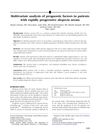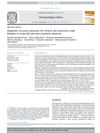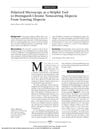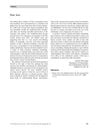 26 citations,
September 2012 in “Journal of The American Academy of Dermatology”
26 citations,
September 2012 in “Journal of The American Academy of Dermatology” Patients with rapidly progressive alopecia areata often have a better outlook and shorter disease duration, with regrown fine hairs and no past alopecia being positive signs.
 41 citations,
September 2018 in “Australasian journal of dermatology”
41 citations,
September 2018 in “Australasian journal of dermatology” No systemic treatment for alopecia areata has strong evidence of effectiveness.
 January 2024 in “American journal of clinical dermatology”
January 2024 in “American journal of clinical dermatology” Ritlecitinib is safe and well-tolerated for treating alopecia areata in patients aged 12 and older.
 106 citations,
December 2015 in “Journal of The American Academy of Dermatology”
106 citations,
December 2015 in “Journal of The American Academy of Dermatology” Correct skin biopsy techniques are crucial to avoid misdiagnosis of skin diseases.
 5 citations,
November 2017 in “Dermatologica Sinica”
5 citations,
November 2017 in “Dermatologica Sinica” Transverse scalp biopsies are more accurate for diagnosing non-cicatricial alopecia, but examining both types is best for accuracy.
 21 citations,
June 2004 in “International Journal of Dermatology”
21 citations,
June 2004 in “International Journal of Dermatology” Most skin diseases in Hajjah, Yemen, were dermatitis, infections, and acne, influenced by local socioeconomic and environmental factors.
December 2022 in “Clinical, Cosmetic and Investigational Dermatology” Androgenetic alopecia negatively affects quality of life, especially in younger, less educated, single, and rural individuals.
6 citations,
January 2019 in “Indian Journal of Dermatology”  38 citations,
January 2019 in “International Journal of Women's Dermatology”
38 citations,
January 2019 in “International Journal of Women's Dermatology” The document concluded that more research is needed to find the best treatment for Frontal fibrosing alopecia.
January 2023 in “Dermatologic Therapy” Androgenetic alopecia significantly affects mental health and quality of life, highlighting the need for psychiatric evaluations.
 November 2024 in “Journal of Cosmetic Dermatology”
November 2024 in “Journal of Cosmetic Dermatology” The hair serum reduced hair loss and improved hair quality in women.
 7 citations,
October 2015 in “American Journal of Primatology”
7 citations,
October 2015 in “American Journal of Primatology” Monkeys with hair loss during pregnancy showed higher stress hormone levels and invested differently in their offspring.
 January 2012 in “Yearbook of Dermatology and Dermatologic Surgery”
January 2012 in “Yearbook of Dermatology and Dermatologic Surgery” No significant difference in iron deficiency between women with or without hair loss.
 January 2024 in “Aging medicine”
January 2024 in “Aging medicine” A COVID-19 infected patient with chronic kidney disease experienced worsened kidney function, hair loss, and unexpected wart clearance.
 19 citations,
August 2010 in “Journal der Deutschen Dermatologischen Gesellschaft”
19 citations,
August 2010 in “Journal der Deutschen Dermatologischen Gesellschaft” Certain plant extracts can effectively treat skin conditions like athlete's foot, chronic vein problems, sun damage, skin growths, vitiligo, and hair loss, and may also improve skin appearance.
 1 citations,
January 2019 in “Skin appendage disorders”
1 citations,
January 2019 in “Skin appendage disorders” A woman's sudden hair loss three years after a bone marrow transplant was a sign of chronic graft-versus-host disease but improved with treatment.
 17 citations,
May 2018 in “Journal of Cosmetic Dermatology”
17 citations,
May 2018 in “Journal of Cosmetic Dermatology” Most women in the study lost hair due to chronic shedding, with stress and nutrient deficiencies being common factors.
 2 citations,
September 2022 in “Cureus”
2 citations,
September 2022 in “Cureus” Almost half of COVID-19 patients in Makkah, Saudi Arabia experienced increased hair loss, especially women and those with chronic diseases.
 1 citations,
January 2023 in “Life sciences”
1 citations,
January 2023 in “Life sciences” GABA contributes to stress-related hair loss, and ginkgolide A may help treat it.

Hair loss in SLE patients is mostly due to chronic telogen effluvium and is linked to moderate disease activity.
April 2014 in “The FASEB journal” The extract helps prevent hair loss and promotes hair growth in stressed mice.
 18 citations,
January 2017 in “Annals of dermatology/Annals of Dermatology”
18 citations,
January 2017 in “Annals of dermatology/Annals of Dermatology” Certain immune cells contribute to severe hair loss in chronic alopecia areata, with Th17 cells possibly having a bigger impact than cytotoxic T cells.
 21 citations,
May 1996 in “Current problems in dermatology”
21 citations,
May 1996 in “Current problems in dermatology” Detailed patient history and physical exams are crucial for diagnosing hair loss.
 11 citations,
January 2012 in “Archives of Dermatology”
11 citations,
January 2012 in “Archives of Dermatology” Polarized microscopy is a quick and free method to correctly identify types of hair loss.
 11 citations,
May 2011 in “Journal of Cutaneous Medicine and Surgery”
11 citations,
May 2011 in “Journal of Cutaneous Medicine and Surgery” Break dancing on the head may cause a type of scarring hair loss that needs early treatment to prevent permanent damage.
 3 citations,
May 2002 in “Therapeutische Umschau”
3 citations,
May 2002 in “Therapeutische Umschau” The document concluded that cyproterone acetate and minoxidil are effective for female hair loss, and a supportive doctor-patient relationship is important.
 2 citations,
June 2018 in “Clinical and Experimental Dermatology”
2 citations,
June 2018 in “Clinical and Experimental Dermatology” Permanent hair loss after a stem cell transplant can be a sign of chronic immune system attack on the scalp.
 1 citations,
July 2002 in “Clinical and Experimental Dermatology”
1 citations,
July 2002 in “Clinical and Experimental Dermatology” The document concludes that understanding hair loss and its psychological impact is crucial for physicians to provide effective counseling and treatment to patients.
January 2021 in “Journal of Clinical and Diagnostic Research” Diffuse hair loss significantly worsens quality of life for females, especially younger women and those with long-term hair loss.























